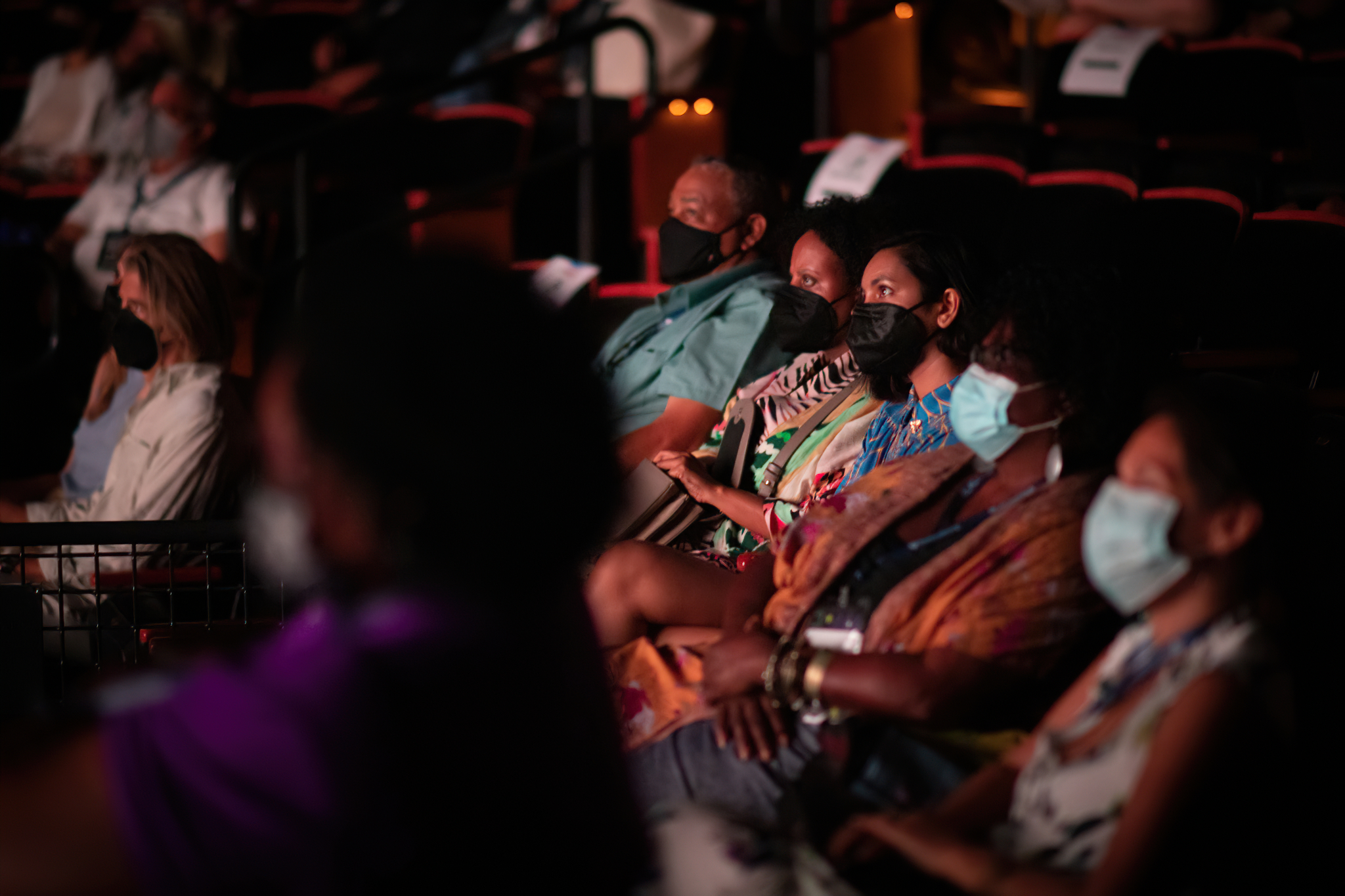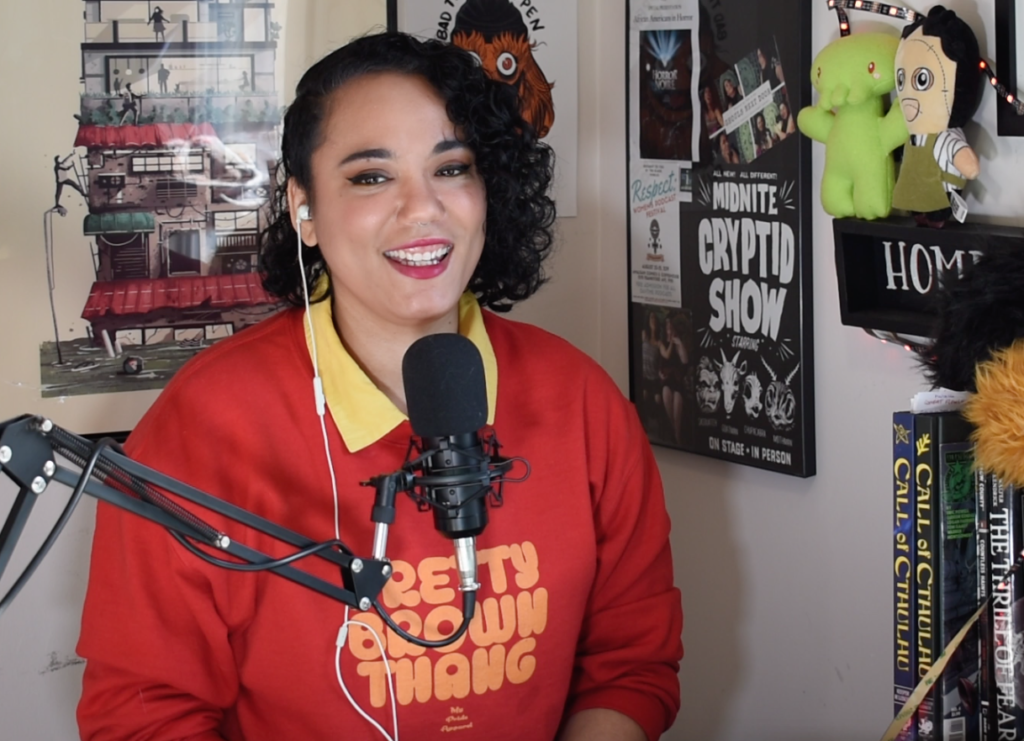
25 Jul 12th Annual BlackStar Film Festival Reflects the Power of Accessibility and Community
BY GABE CASTRO
The 12th annual BlackStar Film Festival, dedicated to uplifting visionary Black, Brown, and Indigenous media creators, returns from August 2 to August 6, 2023. With new venues, 93 films representing 31 countries, revamped live programming, and amplified Philly creativity, the festival ensures there’s something for everyone. Whether that’s family-friendly programming, horror and fringe films, in-depth creator discussions, or even yoga, you can find it all at BlackStar.
This year, BlackStar is venturing out of their usual West Philadelphia venues to create a new campus atmosphere. The festival will take place at three locations, all within two blocks of each other on Broad Street and each wheelchair accessible: The Kimmel Center’s Cultural Campus, the Lightbox Film Center, and the Suzanne Roberts Theatre. Festival goers are encouraged to review the schedule, study it, and plan their festival experience around the pieces that bring them joy.
Festival Director Nehad Khader shared her thoughts on the thematic landscape of the festival, saying, “While there is not a singular theme explored at BlackStar, as we feel that would be limiting, we did find that there are many themes and topics being explored that felt important and present, such as queer futures in cinema, climate justice, and resistance to land theft.”
Accessibility is another theme seen throughout the festival, not only through their curated films and panels but also in the development of the festival overall with their accessible venues and the availability of audio descriptions and closed captioning for nearly all programming for both in person and virtual viewing. Masks are also required for all in-person events as BlackStar prioritizes safety and comfort.
This topic shows up in several of this year’s films as well. Premiering at BlackStar is La Lucha directed by Violeta Ayala. La Lucha tells the story of a group of people with disabilities in Bolivia who trek the Andes in their wheelchairs, in order to protest for their pension and fight for their civil rights.

Feature documentary Fire Through Dry Grass, directed by Andres “Jay” Molina and Alexis Neophytides, is about young Black and brown disabled artists who document their lives at a nursing home in New York during the pandemic, highlighting the dangerous shadows of institutional neglect through art.
A panel on disability justice centers the creators behind the film Unseen, which inspires accessible cinema that intersects the intricacies of immigration, disability, and mental health. Director Set Hernandez Rongkilyo describes the film as “a prism through which we can reflect and refract practices of care and intentionality around access in the filmmaking process.”
While always present at the festival, queer filmmakers and experiences are elevated this year with film premieres and panels. The Black Queer Futures panel explores themes featured in the panelist’s films including gender affirming care, familial conflict, and nonbinary ballroom culture with the backdrop of futuristic storytelling and building futures of power and liberation.
One of Khader’s favorite themes is that of parenting and family. The shorts block Progeny features stories about parents, children fulfilling parental roles, grandparents, and the rich tapestry of unique familial bonds. Feature narrative Girl, directed by Adura Onashile, is a raw and intimate story about a mother, Grace, and her eleven-year-old daughter, Ama. “It’s a breathtaking film with amazing cinematography. We turned up the volume on emotions for the audience with this one,” shares Khader.
We’ll also see the return of the Daily Jawn–the live evening program hosted by BlackStar’s founder Maori Karmael Holmes, filmmaker-artist Rashid Zakat, and Luke Carlos O’Reilly–but with a small twist. In solidarity with the writer’s strike, the show has transformed into the Daily Jawn on Stage, an unscripted and improvised conversation on stage at the Kimmel Center. The first iteration of the new Jawn is about Building Just Pathways, which aims to explore building and recovering institutions that nurture self-determination and equity in film and media production.
At home in Philadelphia, BlackStar Film Festival features many filmmakers from our city of creativity and ambition. Last year, BlackStar launched its Philadelphia Filmmaker Labs program, a year-long fellowship that partners Black, Brown, and Indigenous filmmakers in Philadelphia with skilled local producers to complete short films that premiere at the festival in August.

The 2023 Lab films include An Endoscopy, directed by Zardosht Afshari with producer Aaron Brokenbough Jr., which is about a film student documenting an Iraqi student’s medical procedure. The Freedom to Fall Apart, directed by David Gaines with producer Elizah Turner, is an anthology of four vignettes unpacking the function of shame within the Black American body politic. And All That’s Left, directed by Simone Holland with producer Stephanie Malson, is about Mercedes, someone who wrestles with imagination and reality on a journey of self-discovery.
Alongside the Lab, Blackstar will host many Philadelphian-made films, including Above and Below Ground, a feature documentary directed by Haverford College professor Emily Hong that follows Indigenous punk rock pastors and women activists determined to protect a sacred river in Myanmar, finding power in fighting back through protest, prayer, and karaoke music videos.
BlackStar’s own Chief Communications Officer Imran Siddiquee’s The Difference Between Us will premiere this year. It is about an undocumented Bangladeshi immigrant in Philadelphia who starts to fall for a roommate she’s never met. BlackStar alum and cinéSPEAK Board President M. Asli Dukan’s short horror road trip film, Sundown Road, will be featured in a curated shorts program titled Perturbed alongside other beautifully tense shorts. It is about three friends who encounter the residue of racial discrimination and violence in the United States when their car breaks down.
Jordan Deal’s Wetlands of Our Mother’s Tongues in Concrete is an experimental film that has viewers splitting their attention between the various vignettes, creating an amalgamation of transness, motherhood, trauma, and healing. And Charlyn Griffith Oro’s The Aunties is a preservation piece documenting the lives of Black farmers and culture keepers, Paulette Greene and Donna Dear, that weaves in the legacies of Harriet Tubman and Mt. Pleasant Acres Farm.
“I want people to leave feeling two things: a level of joy both at what they’re seeing, and at being with community,” Khader shares. “That’s what we try to build, a joyful space. And I would love for people to leave feeling inspired. People often meet their future collaborators at BlackStar. The films they end up submitting to the festival are sometimes ones where the seed of that film came to fruition at the previous festival. Inspiration is a really important thing that we hope folks continue to get out of the festival.”
*Featured Image: Image of audience in theaters at BlackStar 2022. Image Credit: Daniel Jackson.
Check out the full festival program and buy tickets and passes here.

Gabe Castro is a Philadelphia-based Latiné multimedia professional specializing in the horror genre. Gabe believes media can be used as a tool to bring social change and works in all she does to create impactful and inspiring media.

Sorry, the comment form is closed at this time.